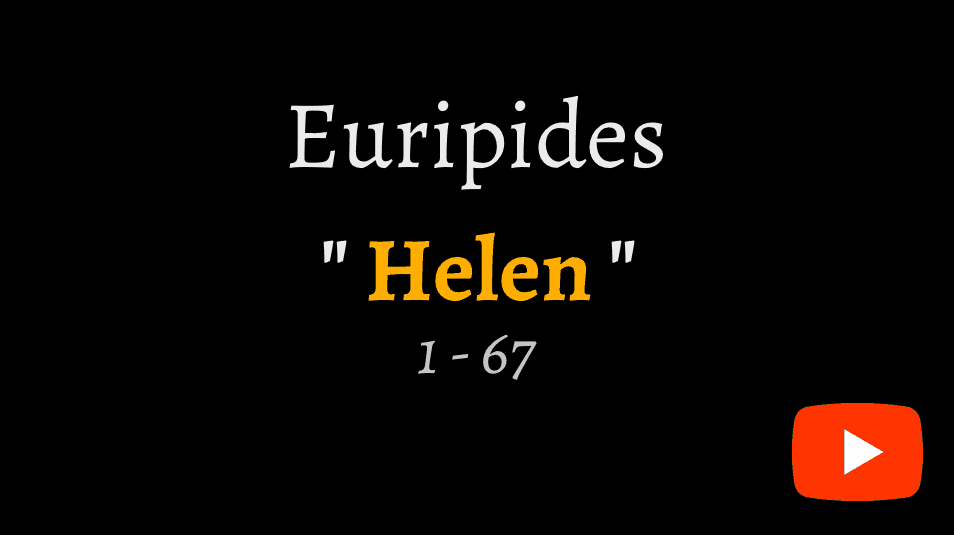• Helena 1-67 •
• Euripides •
You can follow the original text, recited in reconstructed Ancient Greek pronunciation. An English translation follows:
Helen :
"These are the lovely pure streams of the Nile,
which waters the plain and lands of Egypt,
fed by white melting snow instead of rain from heaven.
Proteus was king of this land when he was alive,
living on the island of Pharos and lord of Egypt;
and he married one of the daughters of the sea,
Psamathe, after she left Aiakos' bed.
She bore two children in his palace here:
a son Theoklymenos, because he spent his life
in reverence of the gods, and a noble daughter,
her mother's pride, called Eido in her infancy.
But when she came to youth, the season of marriage,
she was called Theonoe; for she knew
whatever the gods design, both present and to come,
having received this honour from her grandfather Nereus.
My own fatherland, Sparta, is not without fame,
and my father is Tyndareus; but there is indeed
a story that Zeus flew to my mother
Leda, taking the form of a bird, a swan,
which accomplished the deceitful union, fleeing
the pursuit of an eagle, if this story is true.
My name is Helen; I will tell the evils
I have suffered. For the sake of beauty, three goddesses came
to a deep valley on Mount Ida, to Paris:
Hera and Kypris, and the virgin daughter of Zeus,
wishing to have the judgment of their loveliness decided.
Kypris offered my beauty for Paris to marry,
if misfortune is beautiful, and so she won.
Paris, the shepherd of Ida, left his ox-stalls
and came to Sparta, to have me in marriage."
But Hera, indignant at not defeating the goddesses,
made an airy nothing of my marriage with Paris;
she gave to the son of king Priam not me, but
an image, alive and breathing, that she fashioned
out of the sky and made to look like me;
and he thinks he has me —an idle fancy,
for he doesn't have me. And in turn the plans
of Zeus added further troubles to these;
for he brought a war upon the land of the Hellenes
and the unhappy Phrygians, so that he might lighten
mother earth of her crowded mass of mortals,
and bring fame to the bravest man of Hellas.
So I was set up as the Hellenes' spear-prize,
to test the courage of the Trojans;
or rather not me, but my name.
Hermes caught me up in the folds of the air and
hid me in a cloud—for Zeus was not
neglectful of me—and he set me down here in the house of Proteus,
having selected the most self-controlled of all mankind,
so that I might keep my bed pure for Menelaos.
And so I am here, while my wretched husband
has gathered an army and gone over to
the towers of Ilion to hunt down and recover me.
And many lives have been lost for my sake by the streams of Skamandros;
and I who have endured all this am accursed,
and have in appearance betrayed my husband
and brought a great war to the Hellenes.
Why then am I still alive? I heard the god
Hermes declare that I would yet live in the glorious country
of Sparta, with my husband—for Hermes knew I never went to Ilion—
so that I would not go to bed with another man.
Well, as long as Proteus saw this light of the sun,
I was safe from marriage; but now that he is hidden in
the dark earth, the dead man's son hunts
after a marriage with me. But I, out of regard to my husband of long ago,
am throwing myself down as a suppliant before this tomb of Proteus,
for him to keep my bed safe for my husband, so that,
if I bear a name infamous throughout Hellas,
at least my body may not incur disgrace here.
Ἑλένη :
Νείλου μὲν αἵδε καλλιπάρθενοι ῥοαί,
ὃς ἀντὶ δίας ψακάδος Αἰγύπτου πέδον
λευκῆς τακείσης χιόνος ὑγραίνει γύας.
Πρωτεὺς δ᾽ ὅτ᾽ ἔζη τῆσδε γῆς τύραννος ἦν,
Φάρον μὲν οἰκῶν νῆσον, Αἰγύπτου δ᾽ ἄναξ,
ὃς τῶν κατ᾽ οἶδμα παρθένων μίαν γαμεῖ,
Ψαμάθην, ἐπειδὴ λέκτρ᾽ ἀφῆκεν Αἰακοῦ.
τίκτει δὲ τέκνα δισσὰ τοῖσδε δώμασι,
Θεοκλύμενον ἄρσεν᾽ ὅτι δὴ θεοὺς σέβων
βίον διήνεγκ᾽ εὐγενῆ τε παρθένον
Εἰδώ, τὸ μητρὸς ἀγλάισμ᾽, ὅτ᾽ ἦν βρέφος:
ἐπεὶ δ᾽ ἐς ἥβην ἦλθεν ὡραίαν γάμων,
καλοῦσιν αὐτὴν Θεονόην: τὰ θεῖα γὰρ
τά τ᾽ ὄντα καὶ μέλλοντα πάντ᾽ ἠπίστατο,
προγόνου λαβοῦσα Νηρέως τιμὰς πάρα.
ἡμῖν δὲ γῆ μὲν πατρὶς οὐκ ἀνώνυμος
Σπάρτη, πατὴρ δὲ Τυνδάρεως: ἔστιν δὲ δὴ
λόγος τις ὡς Ζεὺς μητέρ᾽ ἔπτατ᾽ εἰς ἐμὴν
Λήδαν κύκνου μορφώματ᾽ ὄρνιθος λαβών,
ὃς δόλιον εὐνὴν ἐξέπραξ᾽ ὑπ᾽ αἰετοῦ
δίωγμα φεύγων, εἰ σαφὴς οὗτος λόγος:
Ἑλένη δ᾽ ἐκλήθην. ἃ δὲ πεπόνθαμεν κακὰ
λέγοιμ᾽ ἄν. ἦλθον τρεῖς θεαὶ κάλλους πέρι
Ἰδαῖον ἐς κευθμῶν᾽ Ἀλέξανδρον πάρα,
Ἥρα Κύπρις τε διογενής τε παρθένος,
μορφῆς θέλουσαι διαπεράνασθαι κρίσιν.
τοὐμὸν δὲ κάλλος, εἰ καλὸν τὸ δυστυχές,
Κύπρις προτείνασ᾽ ὡς Ἀλέξανδρος γαμεῖ,
νικᾷ. λιπὼν δὲ βούσταθμ᾽ Ἰδαῖος Πάρις
Σπάρτην ἀφίκεθ᾽ ὡς ἐμὸν σχήσων λέχος.
Ἥρα δὲ μεμφθεῖσ᾽ οὕνεκ᾽ οὐ νικᾷ θεάς,
ἐξηνέμωσε τἄμ᾽ Ἀλεξάνδρῳ λέχη,
δίδωσι δ᾽ οὐκ ἔμ᾽, ἀλλ᾽ ὁμοιώσασ᾽ ἐμοὶ
εἴδωλον ἔμπνουν οὐρανοῦ ξυνθεῖσ᾽ ἄπο,
Πριάμου τυράννου παιδί: καὶ δοκεῖ μ᾽ ἔχειν —
κενὴν δόκησιν, οὐκ ἔχων. τὰ δ᾽ αὖ Διὸς
βουλεύματ᾽ ἄλλα τοῖσδε συμβαίνει κακοῖς:
πόλεμον γὰρ εἰσήνεγκεν Ἑλλήνων χθονὶ
καὶ Φρυξὶ δυστήνοισιν, ὡς ὄχλου βροτῶν
πλήθους τε κουφίσειε μητέρα χθόνα
γνωτόν τε θείη τὸν κράτιστον Ἑλλάδος.
Φρυγῶν δ᾽ ἐς ἀλκὴν προυτέθην ἐγὼ μὲν οὔ,
τὸ δ᾽ ὄνομα τοὐμόν, ἆθλον Ἕλλησιν δορός.
λαβὼν δέ μ᾽ Ἑρμῆς ἐν πτυχαῖσιν αἰθέρος
νεφέλῃ καλύψας — οὐ γὰρ ἠμέλησέ μου
Ζεύς — τόνδ᾽ ἐς οἶκον Πρωτέως ἱδρύσατο,
πάντων προκρίνας σωφρονέστατον βροτῶν,
ἀκέραιον ὡς σῴσαιμι Μενέλεῳ λέχος.
κἀγὼ μὲν ἐνθάδ᾽ εἴμ᾽, ὁ δ᾽ ἄθλιος πόσις
στράτευμ᾽ ἀθροίσας τὰς ἐμὰς ἀναρπαγὰς
θηρᾷ πορευθεὶς Ἰλίου πυργώματα.
ψυχαὶ δὲ πολλαὶ δι᾽ ἔμ᾽ ἐπὶ Σκαμανδρίοις
ῥοαῖσιν ἔθανον: ἡ δὲ πάντα τλᾶσ᾽ ἐγὼ
κατάρατός εἰμι καὶ δοκῶ προδοῦσ᾽ ἐμὸν
πόσιν συνάψαι πόλεμον Ἕλλησιν μέγαν.
τί δῆτ᾽ ἔτι ζῶ; θεοῦ τόδ᾽ εἰσήκουσ᾽ ἔπος
Ἑρμοῦ, τὸ κλεινὸν ἔτι κατοικήσειν πέδον
Σπάρτης σὺν ἀνδρί, γνόντος ὡς ἐς Ἴλιον
οὐκ ἦλθον, ἵνα μὴ λέκτρ᾽ ὑποστρώσω τινί.
ἕως μὲν οὖν φῶς ἡλίου τόδ᾽ ἔβλεπεν
Πρωτεύς, ἄσυλος ἦ γάμων: ἐπεὶ δὲ γῆς
σκότῳ κέκρυπται, παῖς ὁ τοῦ τεθνηκότος
θηρᾷ γαμεῖν με. τὸν πάλαι δ᾽ ἐγὼ πόσιν
τιμῶσα Πρωτέως μνῆμα προσπίτνω τόδε
ἱκέτις, ἵν᾽ ἀνδρὶ τἀμὰ διασῴσῃ λέχη,
ὡς, εἰ καθ᾽ Ἑλλάδ᾽ ὄνομα δυσκλεὲς φέρω,
μή μοι τὸ σῶμά γ᾽ ἐνθάδ᾽ αἰσχύνην ὄφλῃ.
On Youtube :

